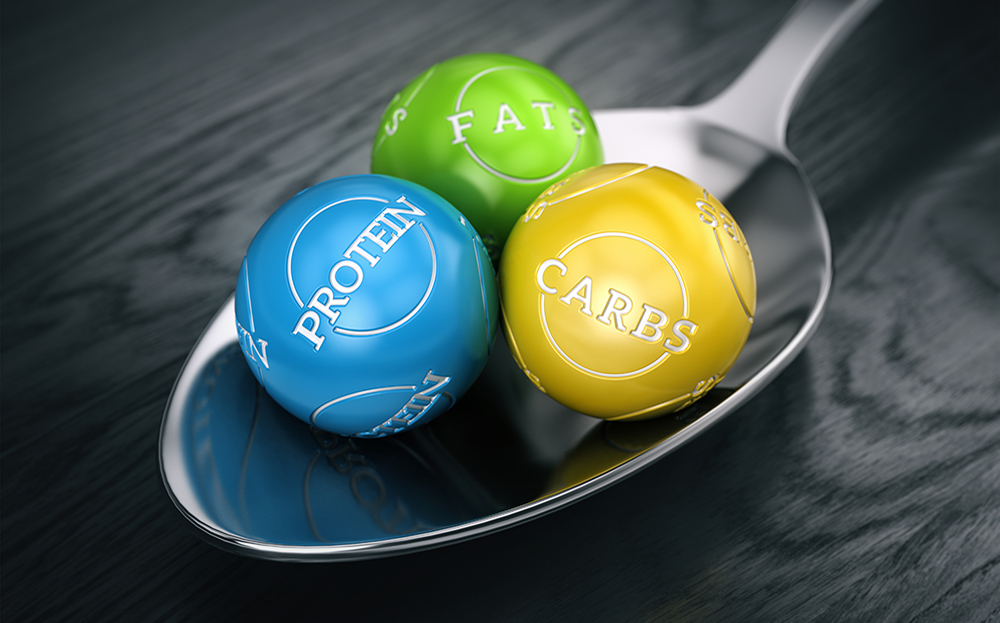Introduction
When it comes to nutrition, most people have little knowledge of what macronutrients really are. Sure, they have heard the term macronutrients, but they do not really understand what they are or why they are important. Macronutrients are the nutritive components of food that we need to consume in substantial amounts as our bodies need them to provide energy, support growth and development, and maintain the body’s structures and systems. There are three macronutrients: protein, fat, and carbohydrates.
Understanding the three types of macronutrients and how they work can help you achieve specific health goals, such as maintaining a healthy weight, improving physical performance, or managing a chronic condition. In this blog post, we will provide a beginner's guide to protein, fat, and carbohydrates including their functions in the body and good sources of each. We will also discuss how to find the right balance of all three macronutrients to support overall health and wellness.
Protein: The Building Blocks of the Body
 As you probably guessed from the section header, protein provides the building blocks for the body, but what does that mean? It means that protein is the macronutrient responsible for building muscle, producing enzymes and hormones, and repairing tissue. Consuming protein provides your body four calories of energy per gram of protein consumed. However, your body only uses protein for a small amount of daily energy as protein’s primary purpose is growth and repair.
As you probably guessed from the section header, protein provides the building blocks for the body, but what does that mean? It means that protein is the macronutrient responsible for building muscle, producing enzymes and hormones, and repairing tissue. Consuming protein provides your body four calories of energy per gram of protein consumed. However, your body only uses protein for a small amount of daily energy as protein’s primary purpose is growth and repair.
The Recommended Dietary Allowance (RDA) for protein is 0.8 grams per kilogram of body weight per day for adults. However, individuals who are physically active or have specific health conditions may have different protein needs. For example, weightlifters may need as much as 2-3 grams of protein per kilogram of body weight. To determine your needed daily protein intake according to the RDA, multiply your weight in pounds by 0.36. For a 200-pound male, that translates into 72 grams of protein per day. In terms of your overall diet, your RDA of protein translates into 10-15% of your daily calories.
You can get your daily protein from both animals and plants. Some good sources of animal protein include meat, poultry, fish, eggs, and dairy products. Good sources of plant-based protein include beans, legumes, nuts, seeds, and whole grains. To ensure your body gets all the amino acids it needs for growth and repair, you should choose a variety of protein sources, both plant and animal. However, in choosing your protein sources, you should also try to avoid processed meats, such as bacon and hot dogs, as they are mostly composed of unnecessary fat and unhealthy additives.
Fat: An Essential Macronutrient
 As you now understand the functions and sources of protein in your diet, let’s move on to the functions and sources of fat in your diet. Fat is responsible for insulating and protecting the body’s organs, assisting in the absorption of certain vitamins and minerals, and providing your body’s energy reserve. Consuming fat provides your body nine calories of energy per gram of fat consumed. While the energy provided by fat is greater than the energy provided by either protein or carbohydrates, your body prefers to store fat for a rainy day rather than use it as a primary source of energy.
As you now understand the functions and sources of protein in your diet, let’s move on to the functions and sources of fat in your diet. Fat is responsible for insulating and protecting the body’s organs, assisting in the absorption of certain vitamins and minerals, and providing your body’s energy reserve. Consuming fat provides your body nine calories of energy per gram of fat consumed. While the energy provided by fat is greater than the energy provided by either protein or carbohydrates, your body prefers to store fat for a rainy day rather than use it as a primary source of energy.
The American Heart Association (AHA) recommends that adults consume 25-35% of their daily calories from fat. However, in choosing your sources of fat, you should choose healthy sources and limit your intake of saturated and trans fats as these types of fat have been linked to an increased risk of heart disease and other health problems.
Like protein, you can get your daily fat from both plants and animals. Good plant-based sources of fat include avocados, nuts, seeds, and vegetable oils such as olive, canola, and avocado oil. Good animal-based sources of fat include reduced-fat dairy products and fatty fish such as salmon and fresh tuna. In choosing your fat sources, you should try to avoid full-fat dairy products, fried foods, and packaged baked goods.
Carbohydrates: The Body's Primary Source of Energy
 Carbohydrates are the last macronutrient we will discuss in this post, and they are responsible for providing your body’s main source of energy. Consuming carbohydrates provides your body four calories of energy per gram of carbohydrates consumed. As mentioned earlier in our discussion of fat, carbohydrates provide far less energy than fat. However, despite this fact, carbohydrates are our body’s preferred source of energy.
Carbohydrates are the last macronutrient we will discuss in this post, and they are responsible for providing your body’s main source of energy. Consuming carbohydrates provides your body four calories of energy per gram of carbohydrates consumed. As mentioned earlier in our discussion of fat, carbohydrates provide far less energy than fat. However, despite this fact, carbohydrates are our body’s preferred source of energy.
The Institute of Medicine (IOM) recommends that adults consume 45-65% of their daily calories from carbohydrates. However, in choosing your sources of carbohydrates, it is important to choose healthy sources of carbohydrates and to limit the intake of sugary foods.
Like protein and fat, you can get your daily carbohydrates from both plants and animals. However, animal-based carbohydrates are limited. Good sources of animal-based carbohydrates include low or non-fat dairy products. Good plant-based sources of carbohydrates include whole grains, vegetables, fruits, beans, lentils, and peas. In choosing your carbohydrate sources, you should try to limit the intake of fruit juices, sodas, candy, and refined flour products such as crackers, breads, cakes, and cereal.
Finding the Right Macronutrient Balance
 Now that you understand the basics of macronutrients, let’s turn the discussion to finding the right balance as it is important for overall health and wellness. The benefits of finding the right balance include feeling your best, maintaining a healthy weight, and performing your best, both mentally and physically. However, determining the right balance of protein, fat, and carbohydrates can be challenging as needs vary based on a variety of factors such as age, gender, and activity level.
Now that you understand the basics of macronutrients, let’s turn the discussion to finding the right balance as it is important for overall health and wellness. The benefits of finding the right balance include feeling your best, maintaining a healthy weight, and performing your best, both mentally and physically. However, determining the right balance of protein, fat, and carbohydrates can be challenging as needs vary based on a variety of factors such as age, gender, and activity level.
As mentioned earlier, you should try to consume 10-15% of your daily calories from protein, 25-35% of your daily calories from fat, and 45-65% of your daily calories from carbohydrates. Unfortunately, the only way you’ll know if you are approaching these numbers is to track your food intake using a food diary or a mobile app. I know this doesn’t sound appealing, but after tracking your intake for a brief period and finding your optimal intake balance, you will be able to shift away from direct tracking unless you need to enter another adjustment period. If you are an athlete, are very over/underweight, or have specific health conditions (e.g., diabetes), I recommend that you work with a healthcare professional or registered dietitian to establish your macronutrient balance.
In determining your balance, please remember that there is no one-size-fits-all approach and that what works for one person may not work for another. It will take some trial and error to find the right balance. However, once achieved, you will be a healthier person.
Conclusion
Understanding the different types of macronutrients and how they work is essential to achieving overall health and wellness. Protein, fat, and carbohydrates are all needed for the body to function properly and play important roles in providing energy and supporting growth and development. By choosing a variety of sources of each macronutrient and finding the right balance, you can support your health and achieve your specific goals.
Tracking your intake of macronutrients will help you find the right balance while working with a healthcare professional or registered dietitian might be needed, depending on your specific goals and needs. Remember that there is no one-size-fits-all approach and that it may take some trial and error to find the right approach for your needs. By understanding the role of protein, fat, and carbohydrates in overall health and wellness, you can make informed decisions about your nutrition and support your health and well-being.







